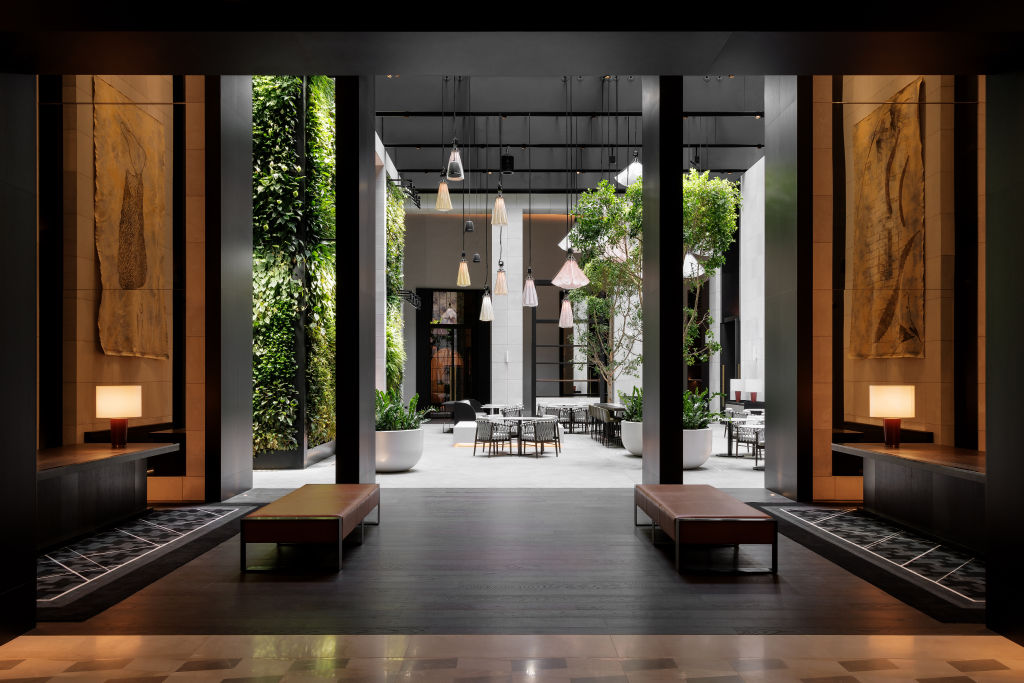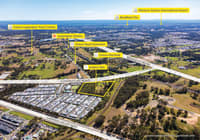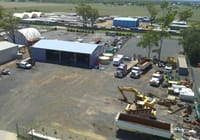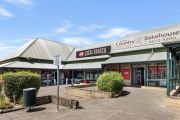
Bold statements and elegant restraint shine through in commercial design awards
Big, bold and bolshie or elegantly restrained – the year’s new hospitality venues have been either breaking the design mould in spectacularly individual fashion or treading lightly and timelessly.
It’s left the 2023 Eat Drink Design Awards jury with a massive headache. “The awards are proving very hard to judge, but looking at the entries has been very exciting,” said jury chair Amy Woodroffe, also the editor of design magazine Artichoke. “We’ve loved exploring them all.
“The best are absolutely world-class. Australians are some of the most well-travelled people in the world, and that’s been reflected in the architecture and interior design of these new restaurants, bars, hotels, cafes and shops.
“Many are deeply rooted in an Australian sensibility and the unique way in which we dine, both fabulous and casual. We go for high quality without being stuffy, and we love being playful. We draw from Europe and Asia and sometimes from the US and end up with a really exciting confluence of ideas.”
The shortlist has just been released, with the final winners to be announced on November 29 from the jury of Woodroffe together with Akin Atelier director Kevin Ho, Hassell associate Di Ritter, Emma Breheny of Good Food and Brent Savage, chef and owner of The Bentley Restaurant Group.
The restaurants in the final stages of the competition include Japanese omakase specialist Yugen on Chapel Street, South Yarra, by Architects EAT, that the panel felt was “other-worldly”. In fact, it started out as a two-storey basement carpark but, through adaptive re-use, came to embody the Japanese word that actually means “profound sense of beauty of the universe”.
The designers say now, “the design sought to capture its own underground universe by embodying Japanese symbolism for the elements of the world – fire, water, earth and wind – by using tactility, texture and light.”
Another finalist is French restaurant Lulu’s from studio BARBARA in Jamberoo, NSW, which the jury considered “a burst of energy”. The designers said there was no limit to the colours, patterns, textures, and objects that were brought together.
“Our inspiration was to recreate the feeling of stepping into an eccentric holiday home somewhere in a French town on the coast of the Mediterranean, where time has layered the walls with memories and pieces of all those from near and far who have moved through,” they said.
H&E Architects’ Japanese Rekodo at Barangaroo, Sydney, is described by the jury as “cool, never cliched”, and the restaurant, bar and deli The Wolf in Brisbane by Melissa Collinson Design, as “giving one the feeling of a strong warm embrace”.
The designers talk of it as, “a fanciful play on a European commonality, with the continental delicatessen housing the restaurant’s takeaway port and in-house store stocked for the artisanal grocer. The deli’s atmosphere corresponds fittingly with the restaurant and bar, through its layers upon layers of abundant detail.”
Pierre Frey’s Sur Le Nil wallpaper greets customers upon entry with a story of commuting animals highlighted by complementary green mouldings and cabinetry.
The finalist bars include TIVA on King Street, Sydney, by Cox Architecture with H & E Architects, Bar Heather in Byron Bay by Miles/Thorp Architects, Woods Bagot’s Bassendean Hotel in Perth and Dolly by Genesin Studios in Adelaide. The hotel section has standouts like The Playford in Adelaide by Hachem and Capella Sydney on Loftus Street, by BAR Studio.
“There are such a diversity of aesthetics and many of the designers just weren’t holding back whatsoever,” said Woodroffe. “It didn’t feel as though we’d had a pandemic; there were no signs that anything had happened.
“The jury observed through these projects that a lot of trust was being placed with the interior designers to deliver some amazing results, and to take risks, and the owners deserve credit for that, given the environment and economic pressures. Many were working with tight spaces or with heritage building, so they had to put a lot of thought into the work and be resourceful and creative.”
With the cafe section of the awards, the judges were most impressed by venues that made the user experience the priority, feeling that cafes should provide comfort and atmosphere equally. Two of the cafes most praised for their design were Convoy in Moonee Ponds, Melbourne, by Studio Esteta, and Glory Days Bondi by Cox Architecture at Bondi Beach, Sydney.
The retail design finalists include Genesin Studio’s Super Egg in Adelaide and Guru Projects’ Gabriel Coffee, both praised for the sense of theatre they’ve introduced into the retail space.










